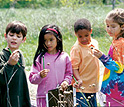|

Media Advisory 07-028
National Science Board Approves and Takes to Congress National Action Plan for 21st Century STEM Education

Board to propose independent national council to coordinate STEM education
October 2, 2007
The National Science Board (Board) today approved and tomorrow will rollout in a Congressional briefing a national action plan for 21st century education in STEM--science, technology, engineering and mathematics. Top among the Board's recommendations are increased coordination of STEM education across the nation--including the formation of an independent, non-Federal National Council for STEM Education--and the preparation of an adequate supply of highly effective STEM teachers. Members of the Board and Members of Congress will be present and make remarks. The Board's National Action Plan for Addressing the Critical Needs of the U.S. Science, Technology, Engineering, and Mathematics Education System will lay out strategies for collaboration among stakeholders from local, state and federal governments, as well as nongovernmental STEM education stakeholder groups to collaborate. Recommendations to be discussed at the briefing will center on voluntary national STEM content guidelines, alignment of STEM learning across grade levels, increased STEM teacher compensation, and the role of higher education. The goal is to ensure that all American students receive the skills and knowledge required for success in the 21st Century. WHAT: Briefing on National Science Board Action Plan for STEM Education WHEN: Wednesday, October 3, 2007, 11 a.m. to noon. WHERE: HC-7, U.S. Capitol Presenters: - Dr. Steven C. Beering, Chairman, National Science Board and President Emeritus, Purdue University
- Dr. Elizabeth Hoffman, Chairman, Education and Human Resources Committee, National Science Board and Executive Vice President and Provost, Iowa State University
- Dr. Jo Anne Vasquez, Member, National Science Board and Vice-Chairman, Commission on 21st Century Education in Science, Technology, Engineering, and Mathematics and Director of Professional Development, Policy and Outreach, Center for Research on Education in Science, Math, Engineering, and Technology, Arizona State University
Representatives of key STEM education stakeholder groups and members of the Board-established Commission on 21st Century Education in Science, Technology, Engineering, and Mathematics will be present. Endorsements from select state governors will also be made available. Journalists interested in attending and covering the roll-out on Capitol Hill should contact Lisa-Joy Zgorski at (703) 292-8311. ***** The National Science Board was established by Congress in 1950, and has two important roles. It provides oversight for, and establishes the policies of, the National Science Foundation. It also serves as an independent body of advisors to both the President and Congress on broad national policy issues related to science and engineering research and education. For more information on recent actions of the National Science Board, please visit: http://www.nsf.gov/nsb.
-NSF-

Media Contacts
Lisa-Joy Zgorski, NSF (703) 292-8311 lzgorski@nsf.gov
Program Contacts
Elizabeth Strickland, PhD, Board Office (703) 292-4527 estrickl@nsf.gov

The National Science Foundation (NSF) is an independent federal agency that
supports fundamental research and education across all fields of science and
engineering, with an annual budget of $6.06 billion. NSF funds reach all 50
states through grants to over 1,900 universities and institutions. Each year,
NSF receives about 45,000 competitive requests for funding, and makes over
11,500 new funding awards. NSF also awards over $400 million in
professional and service contracts yearly.
 Get News Updates by Email Get News Updates by Email
Useful NSF Web Sites:
NSF Home Page: http://www.nsf.gov
NSF News: http://www.nsf.gov/news/
For the News Media: http://www.nsf.gov/news/newsroom.jsp
Science and Engineering Statistics: http://www.nsf.gov/statistics/
Awards Searches: http://www.nsf.gov/awardsearch/
| 


